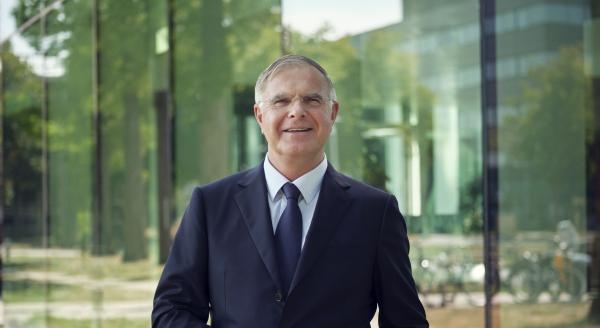Neuroprosthesis serves as communication aid for ALS patient for 7 years

A neuroprosthesis enabled an ALS patient to communicate independently for seven years, showing the long-term potential of brain-computer interfaces.
In 2015, a team at UMC Utrecht treated a woman with ALS by implanting a neuroprosthesis to help her communicate. Now, in a new publication, the Utrecht team shows for the first time that this neuroprosthesis was successfully used independently at home over a period of seven years. It served as the participant’s primary communication tool and became fully integrated into her daily life. This demonstrates that neuroprostheses can enable patients to communicate more effectively and maintain control over their lives for a longer time, until the disease progresses to a point where even the prosthesis can no longer provide support.
The results of the research, lead by Mariska van Steensel and Nick Ramsey, can be found in the New England Journal of Medicine.
ALS is een progressieve spierziekte
People with ALS face a poor prognosis. The disease progressively affects more muscles, eventually making movement, communication, and ultimately life itself impossible. In the final stage, a patient may develop Locked-In Syndrome, in which no form of communication is possible anymore.
The neuroprosthesis as a solution
To compensate for the progressive decline, researchers at UMC Utrecht are working on the development of neuroprostheses, also known as Brain-Computer Interfaces (BCIs). A neuroprosthesis consists of electrodes implanted in the brain that pick up signals. These signals are then translated via a computer connection into commands for operating a computer, such as a mouse click. This enables a patient to continue communicating even after the onset of Locked-In Syndrome.
How long does a neuroprosthesis work?
For the first time, the UMC Utrecht team conducted a long-term study on an ALS patient who received a neuroprosthesis. The study showed promising results. Mariska: “Our participant used the system independently for seven years, and for several of those years it was her only way of alerting her caregiver, both during the day and at night.” The device itself continued functioning well. Only when the disease had progressed to the point that the brain could no longer send strong signals did the neuroprosthesis stop being effective.
While the disease cannot be halted with a neuroprosthesis, the technology can still make a crucial difference in the quality of life and autonomy of people with ALS, even in later stages. “As long as the brain is able to send a message, the system works—and it can make a tremendous difference in the lives of these patients and their families,” says Mariska.
Neuroprostheses are becoming more accessible
The development of neuroprostheses is advancing rapidly, with significant investment being made. It is expected that in the coming years, these devices will become widely available and can be used to help people with severe communication impairments caused by ALS or other conditions. This is also reflected in the current edition of the New England Journal of Medicine, which features a second article on BCIs. “In that other study, a person in an earlier stage of ALS was able to communicate quickly and accurately using a BCI. This shows that BCIs can also be valuable for people with less severe impairments.”
Furthermore, (new) treatments that slow the progression of ALS are likely to extend the period in which a BCI can be useful.
“We are currently working on improved versions of the technology and hope to demonstrate its value as a communication tool in the daily lives of these patients in our new projects: CORTICOM, INTENSE, and INTRECOM,” Mariska concludes.
Source: UMC Utrecht

Read the interview with Jan van de Winkel about his keynote for the opening of Utrecht Science Week on September 26
At the opening of Utrecht Science Week, Prof. Dr. Jan van de Winkel will share how immunotherapy, AI, and collaboration are key to groundbreaking advances in fighting and preventing cancer and other serious diseases.

New events added to Utrecht Science Week programme
Utrecht Science Week takes place from September 26th to October 5th. In recent weeks, several new events have been added to the already extensive programme. Residents, professionals, researchers, and students interested in the themes of health and sustainability can choose from a wide variety of interesting and inspiring events. Below is a selection of some recently added program items.

New European project supports young survivors
PanCare4AYA is a European project uniting 29 partners from 14 countries to improve aftercare, guidelines, and tools that enhance the long-term quality of life for adolescents and young adults who have survived cancer.

Utrecht Science Week 2025 programme announced
The programme for Utrecht Science Week 2025 has been announced. From now on, you can register for one or more of the many inspiring events. More events will follow in the coming weeks. Take a look, register for the events you would like to attend and don’t miss anything!